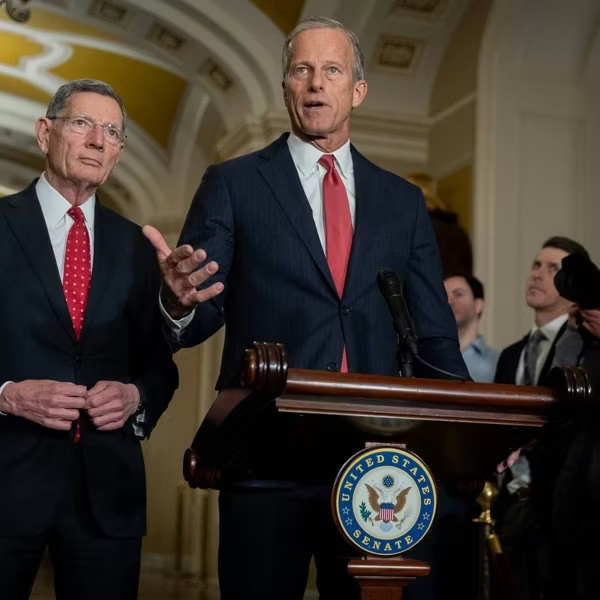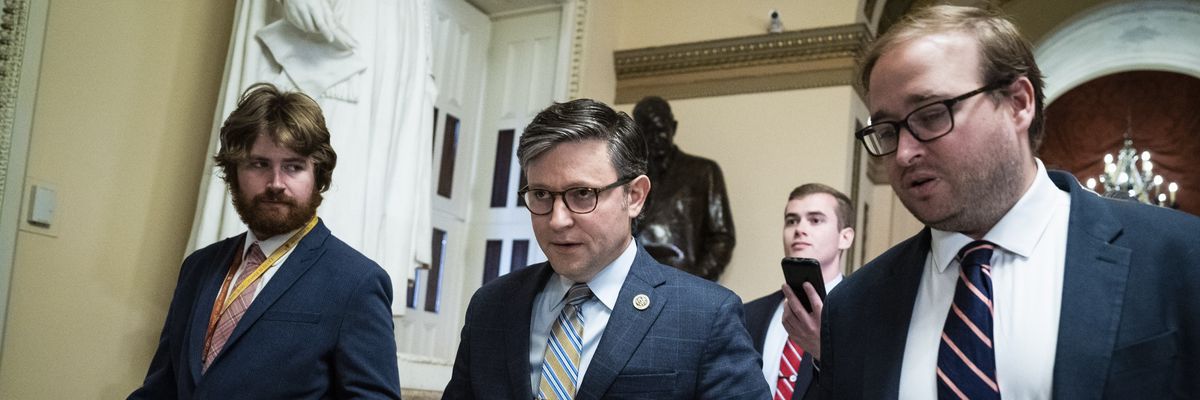The Congressional Budget Office said Thursday that nonmilitary federal spending could face tens of billions of dollars in automatic cuts if lawmakers fail to agree on full-year government funding bills for 2024.
Under the Fiscal Responsibility Act (FRA)—bipartisan legislation passed last year to avert a debt ceiling catastrophe—automatic spending cuts are required if lawmakers don't pass annual appropriations bills by April 30. Congress is currently working under a two-tiered continuing resolution that funds government agencies through January 19 and February 2.
With negotiations at an impasse as Republicans demand lower spending levels than were agreed upon in the FRA as well as draconian anti-immigrant policies, House Speaker Mike Johnson (R-La.) has suggested that he could pursue a full-year continuing resolution that would mean major cuts to key federal programs.
According to the CBO, nondefense spending would be cut to $736 billion, down from the current level of $777 billion. Military spending would take a much smaller hit, falling from $860 billion to $850 billion.
Rep. Brendan Boyle (D-Pa.), the top Democrat on the House Budget Committee, said Thursday that the CBO's analysis "confirms what we already knew: Speaker Johnson's attempt to trigger devastating across-the-board cuts is not an actual government funding plan, but another dangerous threat that would put American families on the chopping block."
"House Republicans have governed through brinkmanship for more than a year now—first with a default threat, then a series of shutdown threats, and now this sequestration threat," said Boyle. "Their reckless attempts to achieve steep budget cuts failed time and time again last year, and they will fail again this year."
"Passing full-year government funding bills is the most basic task of Congress," Boyle added. "We cannot allow indiscriminate and harmful cuts to happen because House Republicans are incapable of doing their jobs."
The FRA caps discretionary federal spending at $1.59 trillion for fiscal year 2024, leaving $886 billion for the U.S. military and $704 billion for nonmilitary spending, which covers healthcare, housing, transportation, and more.
But as part of an FRA "side deal," lawmakers agreed to an additional $69 billion in nonmilitary spending. Now, however, House Republicans are trying to ditch "some if not all of the $69 billion in extra nondefense spending," Roll Call reported last month.
As the Senate Budget Committee stressed in a memo released late Thursday, the CBO's analysis examines only the letter of the FRA, excluding the $69 billion side deal.
"If negotiators limit themselves to only the portion of the agreement that is in law, as many House Republicans are demanding, nondefense programs will be cut 9% from current levels and defense programs will be leaving a 3% increase on the table," the memo noted. "CBO's report should serve as a wake-up call that Congress must reject these harmful cuts."




